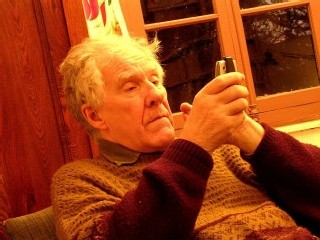7TH LECTURE AT THE GRAMSCI MONUMENT, THE BRONX, NYC: 7TH JULY 2013 THE UNCERTAINTY-RELATION KNOWLEDGE-TRUTH MARCUS STEINWEG

Alain Badiou
"That which is a subject," says Alain Badiou, "is the new human being," who begins to exist out of a deficiency of self and being, who begins to become a subject. Agamben, too, defines the human subject as something which "being and having to be only its possibility or potentiality, humankind fails itself in a certain sense and has to appropriate this failing – it has to exist as potentiality”. The fact "that must constitute the point of departure for any discourse on ethics is that there is no essence, no historical or spiritual vocation, no biological destiny that humans must enact or realize. This is the only reason why something like an ethics can exist, because it is clear that if humans were or had to be this or that substance, this or that destiny, no ethical experience would be possible – there would be only tasks to be done". The subject's ethicality refers to this ontological abyss, to a primordial lack. Precisely because the subject exists only as the subject of this lack, as a subject of the abyss is there something resembling a subject. The subject appropriates its being as a subject as a being able to be a subject. It touches itself at the point of its ontological fragility in order to affirm this touching as an act of its becoming a subject. It is a subject of self-affirmation and self-invention. In contact with that which radically transcends it, it constitutes itself as the autonomous and, in a certain sense, experimental receiver of its ontological limit. Accordingly, in American pragmatism Deleuze saw one of those "attempts to transform the world, to think a new world or new man insofar as they create themselves".
The subject's tornness means that it is a subject of the exterior, a subject of becoming, of the deed, of contingency and incommensurability instead of being, within its interiority and identity, a defusing pseudo-subject that assimilates itself to its factual status as object. The deed implies that it elevates the subject above the ground of facts. The act is the moment in which the subject affirms itself as a subject by moving away from itself while violating its reality in the objective world. A deed exists only as a self-violation, as excess. The subject of the deed distances itself from its position and its status in the structure of facts which is the world of its evidence in order to accelerate itself beyond its factual reality. Whither? Toward the limit of the world of facts which indicates the inconsistency of instituted realities. Therefore, any deed implies puncturing the web of reality through to an unreality so that the subject of the deed touches upon a knowledge which is not of this world because it refers to its limit. The subject of the deed goes through this experience of the limit; it moves along a border which, instead of marking off a world this side from another world beyond, marks an incision in the immanence of the one and only world. The touching of this incision, its execution is what is meant by the Latin word decisio. The deed is an act of incisive decision. It posits an incision and marks a tear which distances all realities and every subject from itself. The decision is a touching of this difference which divides the body of the world as well as the body of the subject. The deed leads the subject to a knowledge that shakes its evidence and evacuates its certainties. Suddenly the subject finds itself in the space of a loneliness which is the dimension of its ontological insecurity: the dimension of philosophy. Nothing can be relied upon because it is only in this desert that the subject erects and affirms itself as a perpetrator.
